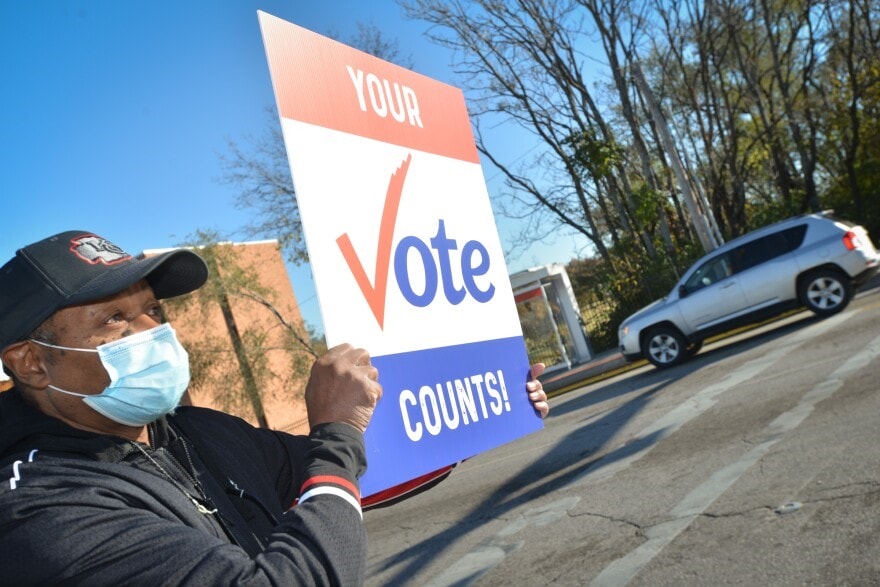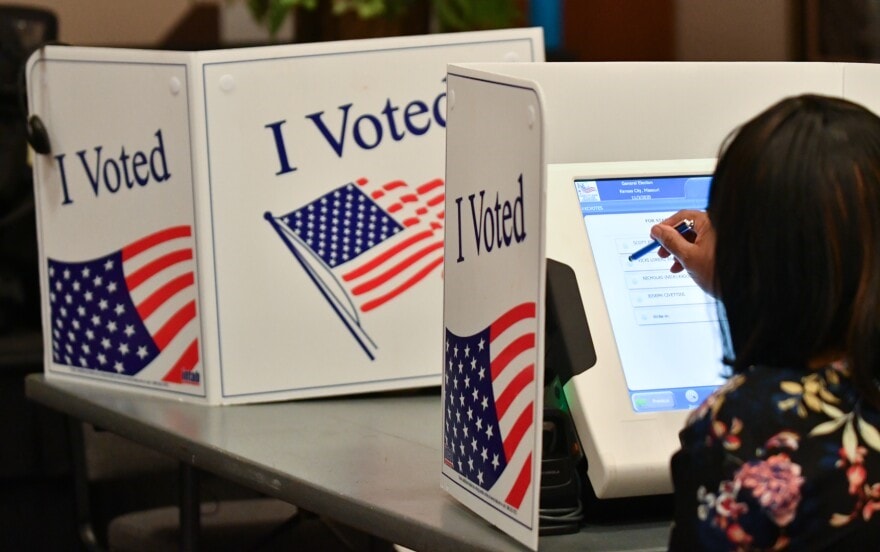Kansas City Election Guide: What Voters Should Know About the April 2023 Ballot Kansas City voters are narrowing the field for mayor and city council seats in redrawn council districts. Plus, residents will decide whether to approve taxes on recreational marijuana and Airbnbs.
Published March 13th, 2023 at 12:00 PM
Above image credit: In-person, no excuse absentee voting for municipal elections in Missouri begins March 21. Election day is April 4. (Carlos Moreno | KCUR 89.3)Kansas City voters will narrow the field of City Council hopefuls in the April 4 primary that determines which candidates advance to the June 20 general election.
This year’s most pressing issues involve the desperate need for affordable housing, solutions to homelessness, proposals to address the alarming homicide and violent crime rate, a sensible approach to development incentives and strategies to improve basic services and neighborhood livability.
The 2023 mayor’s race is a ho-hum event, with incumbent Quinton Lucas facing perennial mayoral candidate Clay Chastain, whose primary residence is in Virginia but who uses his sister’s address in Kansas City.
All 12 council seats are also on the ballot, and six of the 12 current council members are term-limited out, so the new council will be substantially different. Some of the races, while non-partisan, are heated and intense.
In the April 4 primary, voters will choose their preferred candidate in six at-large (citywide) council races. They will also vote for their preferred in-district candidate for where they live.
The top two vote-getters in each race advance to the general election. If there are only two candidates for a particular seat, each candidate automatically advances to the general election.
Two in-district seats have only one candidate on the ballot. In District 2 in the Northland, Wes Rogers faces no opposition. He previously served two terms in the Missouri House. In District 5 south of the Missouri River, incumbent Ryana Parks-Shaw has no opponent.
This year represents the first council election under Kansas City’s redistricting from the 2020 Census, so the six council boundaries look substantially different from the last council election in 1999. That means residents may be voting in a different district than they have in the past.
The biggest boundary change affected the Northland, which is now divided horizontally rather than vertically. District 1 previously covered Clay County and a tiny part of Platte County, but now it covers neighborhoods generally north of Barry Road across both Platte and Clay counties. District 2 is generally south of Barry Road. District 4 now extends partially into the Northland.
Districts 3, 4, 5 and 6 south of the Missouri River also have new boundaries, with big impacts for Midtown, the Country Club Plaza and south Kansas City.
Along with choosing City Council representation, voters on April 4 will consider three important ballot measures: one proposal to impose a local tax on marijuana sales, and two questions pertaining to a tax and room fee on short-term rentals, like Airbnbs, that have become controversial nuisances in some neighborhoods.
Here’s what you need to know to vote in Kansas City’s municipal election in April.

Key Dates
- March 8: The deadline for registering to vote before the primary election has passed.
- March 21: In-person, no excuse absentee voting begins. In the past, Missouri required a valid reason to vote absentee. Now, part of a new state election law allows people to vote in the two weeks prior to the election without an excuse like physical disability or travel on Election Day. If you use the no-excuse option, you must vote at an election office in-person and cannot mail in an absentee ballot.
- April 4: Election day. Polls are open from6 a.m. to 7 p.m.
How do I Register to Vote?
In Missouri, you must be 17-and-a-half years old to register and 18 years old by Election Day to vote. You must also be a Missouri resident and a United States citizen.
The deadline to register to vote before Missouri’s primary election was March 8, 2023.
Not sure whether you’re already registered? This page at the Secretary of State website can help you find out.
Do I Need a Photo ID?
Yes. Under an election law passed last year, valid photo identification is required to cast a ballot in Missouri.
Valid IDs include non-expired Missouri Driver’s license; state- issued ID, non-expired U.S. passport or military photo ID. You can get a photo ID for free at the Missouri Department of Revenue or by calling 573-526-VOTE (8683).
Where Do I Vote?
Sample ballots and polling information are available from Kansas City’s election authorities:
- Kansas City Election Board (this applies to Kansas City residents who live south of the Missouri River).
- Platte County Election Board (this applies to Kansas City residents who live in Platte County).
- Clay County Election Board (this applies to Kansas City residents who live in in Clay County).
- Cass County Election board (this applies to Kansas City residents who live in Cass County).
What Are the Key Issues on the Ballot?
There are three ballot questions for Kansas City voters to decide. Each requires a simple majority to pass.
Question 1
Now that recreational marijuana is legal for adult personal use in Missouri, Kansas City officials want to tax it locally to provide funding for some priorities.
Question 1 on the April ballot proposes a 3% local tax on marijuana purchased for non-medicinal use. This would be on top of the 6% state tax already authorized.
Kansas City estimates the local marijuana tax would generate about $3 million annually in the first few years, growing to $10 million per year after the fifth year. That money would be spent on addressing illegal dumping, homelessness solutions and violence prevention programs.
Other metro area cities are also seeking voter approval for their own 3% adult non-medicinal marijuana tax, including Blue Springs, Independence, Grandview, Lees Summit, Raytown, Gladstone and North Kansas City. Jackson County is also seeking approval for a 3% county tax.
Questions 2 and 3
The number of short-term rentals such as Airbnbs has exploded in Kansas City in recent years, with little regulation or oversight. A third-party site listed more than 4,000 short-term rentals in Kansas City between August 2018 and August 2022.
Some neighborhood leaders have complained vociferously to the City Council about the impact to their quality of life from the noise, trash, traffic and loud parties caused by unruly Airbnbs. A November 2022 city audit found that Kansas City misses out on about $2.3 million annually by not taxing short-term rentals as it does hotels.
The auditor’s office also found that a whopping 93% of short-term rentals fail to comply with city rules that they be licensed, costing the city more than $1 million in lost permit fee revenue.
Question 2 on the ballot would subject short-term rentals to a 7.5% tax, similar to what hotels and motels already pay. Supporters say this would level the playing field.
Question 3 would increase the current occupancy fee for hotels and motels from $1.50 per night per room to $3 and would require short-term rentals to pay that fee. The city estimates the fee could generate $4.5 million annually and taxing short-term rentals could generate about $2 million to $3 million per year.
These extra costs would be paid by visitors using the accommodations, not by local residents.
City officials said the revenue would help support the city’s convention and tourism activities, including marketing and promotion, and would cover some of the costs to improve enforcement of the short-term rental regulations.

Who is Running for City Council?
The top two vote getters in each race advance to the June 20 general election. Here’s a rundown of the citywide races — an in-district guide will come soon.
1st District At-Large
Kevin O’Neill (incumbent) was the longtime publisher and editor of the Kansas City Labor Beacon and is a strong proponent of the Northland, unions, labor rights and well-paying jobs. His other priorities include safe neighborhoods and responsible spending of taxpayer dollars.
According to his January campaign finance report, O’Neill had $179,185 on hand. Most of his donations came from individual donors and political action committees of the law firm Husch Blackwell and the architecture engineering company TranSystems Corporation.
Ronda Smith works for a management firm in accounting and previously worked in the real estate industry. Her husband is a retired Kansas City police officer. Smith is running against what she sees as government overreach during the pandemic and favors strong support for police and “traditional” values.
According to her latest campaign finance report, Smith had $3,751 on hand. Smith received the most contributions from individual donors and some businesses like Rancho Grande Cantina and Belvoir Winery in Liberty, Missouri.
Pam Mason served as Clay County Clerk and then one term as Clay County Presiding Commissioner, before she was defeated by Jerry Nolte in 2014. She worked as a bank investment officer for 18 years and was a critic of Kansas City’s Economic Development Corp. while serving on the Kansas City Tax Increment Financing Commission. Her council priorities would include strong support for law enforcement and small business development.
As of her latest campaign finance report, Mason had $11,747 on hand. Mason received donations from a few individual donors, but largest donation was from herself.
2nd District At-Large
This is an open seat as Teresa Loar is term-limited out.
Lindsay French is a business owner and lead designer at TJP Strategies, a consulting firm. Her campaign treasurer is Scott Wagner, who served two City Council terms and is now a Clay County Commissioner. French says she would be a problem solver and common-sense coalition builder.
According to her latest campaign finance report, Frank had $25,114 on hand. French received donations from a combination of political action committees, labor unions and individual donors. Most of the donations were from unions, such as Roofers Local 20 and Taxpayers Unlimited, which is connected to the International Association of Fire Fighters (IAFF) union.
Mickey Younghanz is a musician and construction contractor/builder of Northland homes. His priorities include public safety, small business development and vocational training. He ran for Missouri State Senate in 2020 but lost to Lauren Arthur. He has been affiliated with the NRA and Missouri Right to Life.
As of his latest campaign finance report, Younghanz has $2,192 on hand. He received campaign contributions from mostly individual donors.
Jenay Manley is a single mom and activist for tenants’ rights. She has been an outspoken leader and organizer with KC Tenants, the citywide tenants union. She says she will be a voice for poor and working-class people, and her priorities include affordable housing, economic justice and reliable public transit.
According to her latest campaign finance report, Manley had $10,410 on hand. She received numerous small donations from individual donors, including from members of the KC Tenants, a union for working class tenants across the city. She also received a large donation from the Mid-America Carpenters Regional Council Union.
3rd District At-Large
Brandon Ellington (Incumbent) is seeking a second term on a platform of representing the underprivileged and disenfranchised. He is frequently a lone dissenting vote on city ordinances but he successfully pushed for the city’s new office of citizen engagement, created in 2022. In 2021 he was found guilty of a city assault charge stemming from an altercation with a political foe. Ellington appealed. The circuit court sent his case back to municipal court for him to fulfill his probation through July 28, 2023.
According to his latest campaign finance report, Ellington had $18,720 on hand. Ellington primarily received campaign donations from individual donors.
Melissa Patterson Hazley is a researcher, college teacher and campaign consultant. She serves on the Central City Economic Development Sales Tax Board and says she would be a collaborative voice for positive change. Her priorities include diverse and affordable housing options, good paying jobs, enhanced public safety, improved basic services and opportunities for youth, including support for the public schools.
As of her latest campaign finance report, Patterson Hazley had $75,875 on hand. Patterson Hazley received campaign contributions from political action committees, labor unions and individual donors. Two of the largest donations were from Block Real Estate Services and the Mid-America Carpenters Regional Council.

4th District At-Large
This is an open seat as Katheryn Shields is term-limited out.
Jess Blubaugh is Chief Philanthropy Officer for the Greater Kansas City United Way, is on the board of the Mid-America LGBT Chamber of Commerce and is a Longfellow neighborhood leader. Her priorities include improving basic services, promoting safe and healthy neighborhoods and responsible development, and expanding affordable housing opportunities.
According to her latest campaign finance report, Blubaugh has $55,109 on hand. Most of her donations came from individual donors.
Justin M. Short grew up in the Northland, now lives downtown and says he would represent all parts of the city, both North and South. He is the 4th District’s representative on the LGBTQ Commission. He supports downtown’s development and says he would be a proponent for community-driven development throughout the city. Another priority is strong basic services.
As of his last campaign finance report, Short has $60,956 on hand. He received donations from political action committees and individual donors. One of the largest donations he received was from Richard Chaves Jr., chairman of the Northland Strong PAC and Management Director of PCAKC, a parking company.
Crispin Rea served on the Kansas City School Board in the early 2000s. He was a caseworker with the Kansas City No Violence Alliance before becoming an assistant prosecuting attorney. He has served seven years in the Jackson County Prosecutor’s office, mostly with the Special Victims Unit. He volunteers with the Mattie Rhodes Center and the Police Athletic League. His priorities include safe neighborhoods, strong basic services, small business development and job creation.
According to his latest campaign finance report, Rea has $80,334 on hand. Rea received campaign contributions from individual donors, political action committees, and unions. Two of the largest donations were from the MO State Council of Fire Fighters union and Holman Schiavone, a law firm in Kansas City.
John D. DiCapo is well-known for his family’s civic activism and for running Italian Gardens Restaurant for decades. He opened DiCapo Foods wholesale manufacturing company, which produced Jim’s Famous Hot Tamales and Italian cookies, but he’s now winding down the food business. He lives in Crown Center and says he wants to be a voice for neighborhoods, ordinary people and small businesses.
As of his latest campaign finance report, DiCapo has $7,725 on hand. DiCapo received campaign donations from individual donors and the Accurso law firm.
Grace Cabrera is a Cuban immigrant whose family fled the Castro regime. Her priorities include improved infrastructure, safer neighborhoods and better accountability for tax dollars spent.
According to her last campaign finance report, Cabrera has $1,734 on hand, her donations are mostly from individual donors.
5th District At-Large
This is an open seat as Lee Barnes is term limited out.
Michael Kelley is the policy director of BikeWalkKC and a member of Kansas City’s Environmental Management Commission. His priorities include strengthening public health services, addressing homelessness and affordable housing needs, improving basic infrastructure and addressing climate change.
As of his latest campaign finance report, Kelley had $23,420 on hand. Kelley received most of his campaign contributions from individual donors.
Darrell Curls served nine years on the Hickman Mills School Board but resigned in 2017 because of what he saw as too much board turmoil and turnover. He is a member of the South Kansas City Alliance and the Northland Chamber. He recently retired from Ford Motor Co., where he was a Union Steward. His priorities include improved city services such as trash collection, reduced crime, affordable housing and good-paying jobs.
According to his latest campaign finance report, Curls had $44,177 on hand. Curls received numerous donations from individual donors and businesses. Curls also received donations from political action committees and unions. One of the largest donations Curls received was from Taxpayers Unlimited, which is connected to the International Association of Fire Fighters (IAFF) union.
Theresa Cass Galvin served two terms on the Jackson County Legislature and ran unsuccessfully for Jackson County Executive against Frank White in 2022. She has 30 years of business management experience in the construction industry. She says she would be a watchdog for fiscal responsibility, a strong proponent of law enforcement and an advocate for small business.
As of her last campaign finance report, Cass Galvin had $19,999 on hand. She received a large donation from Northland Strong PAC, a political action committee that raises awareness to issues in the Northland and supports pro-development candidates.
6th District At-Large
Andrea Bough (incumbent) is a lawyer specializing in commercial real estate, land use and development. She has been a volunteer with Harvesters and Sheffield Place and served on the Jackson County Mental Health Fund Board. Her priorities include strong basic services, violent crime prevention, tenant advocacy, smart growth, connecting citizens to social services and addressing the climate emergency.
According to her latest campaign finance report, Bough had $80,654f on hand. Bough received small and large donations from political action committees, unions, and individual donors. One of the largest donations came from Richard Chaves Jr.
Jill Sasse was a longtime public school teacher who says she is running to keep the city safe and prosperous for future generations. Her priorities include safety, livability and stopping local government overreach.
As of her last campaign finance report, Sasse had $2,056 on hand. Her campaign is mostly self-funded, but some donations came from individual donors.
Mary Nestel owns the Nestel Insurance Agency. She says she is running to address the city’s problems with crime, graffiti, trash, homelessness, inadequate support for small business, and delays in commercial development approvals. She wants more support for police and a cleaner city.
According to her latest campaign finance report, Nestel has $512 on hand. Her campaign contributions came mostly from individual donors.
This story first appeared on KCUR 89.3, a member of the KC Media Collective. Lynn Horsley is a freelance writer in Kansas City. Chris Fortune contributed to this report.



